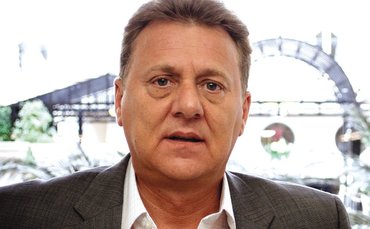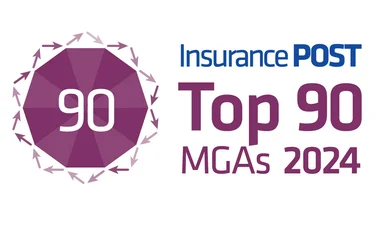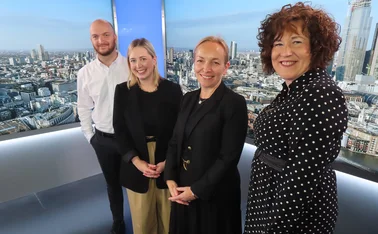
Interview: David Mairs - my side of the story
Breaking a seven-year silence on the firm he founded, David Mairs defends the sale of Merlin, then Ashworth Mairs Group, to Hermes for £62m, offering his insight into the loss adjuster's downfall, the state of the market and why the time is right for his return.

Speculation over the value of loss adjusting firms has dominated the claims landscape recently. Having supported the £27m management buyout of Davies in 2008, private equity house LDC reported an internal rate of return of 45% on its £8.6m investment when it was sold for £60m to Electra Partners in October last year.
And last week, Fairfax Financial Holdings revealed that it was set to make $260m (£161.5m) after agreeing to dispose of its 43.4% stake in Cunningham Lindsey to PE house CVC Capital Partners, as part of a recapitalisation of the loss adjusting group.
Meanwhile, in the aftermath of Merlin's collapse in August this year, there have been suggestions that one of the primary reasons the firm failed was that it could never live up to the £62m price tag it was saddled with when acquired by Hermes in 2005.
This has prompted David Mairs to break his seven-year silence on the firm, then known as Ashworth Mairs Group, that he founded in 1992 using a £40 000 overdraft and helped build from a one-man operation based above a chip shop into a national adjuster.
Commenting on the aftermath of AMG's sale, Mairs is quick to insist that he did not go on a champagne-fuelled bender on 30 September 2005, the day the business was sold.
"These things can drag on until midnight, but the deal was actually signed early that day, at which point everyone decided it was only fitting to go out and have a celebratory lunch," he says.
"However, [long-standing business partner and former AMG chief operating officer] Helen Wareham and I politely declined the offer [having quit the business on completion of the deal] because it was [then chief technical officer] Kevin Wood and [chief financial officer] David Roberts' day. They led the management buyout.
"Instead, Helen and I quietly disappeared to my car, shed a few tears together, drove in silence down the M56 and ate a chicken sandwich at Chester Service Station, having just had 60-odd million credited to our banks."
Whether Mairs is joking when he says that the pair have since shared a chicken sandwich at that same service station every year on the sale's anniversary, only the two of them know.
However, he admits that, with AMG having been a significant part of his life for 13 years, he had mixed emotions the day of the sale.
Price tag debate
"People may ask why I have decided to break my silence now. There are two main reasons. I was incredibly saddened by the demise of Merlin, but not shocked. There have also been some comments made about AMG, and its price tag, which are simply incorrect," he says.
"As a sole trader, my accounts were never in the public domain, although we were transparent with our clients and people who needed to know, but I am happy to give you some facts and nail the myth that the price was too high.
"By any measure, AMG was the most financially successful loss adjuster in living memory. In the year I sold the business, the net profit forecast was £8.3m, with no bank borrowing or debt. The year before, it was in the high sixes and the year before that the high fives.
"We had the most highly developed supply chain of any loss adjuster, and dozens of clients with strong relationships - but none that accounted for more than 10% of turnover or profit.
"If a business is forecast to do £8.3m net - and there was consistent linear growth year on year with no peaks and troughs - then by any measure it is worth a substantial sum."
Mairs claims that, rather than immediately accepting Hermes' offer, he gave the bid careful consideration, even turning down offers that would have made him richer.
"The highest bid I received was £83m. But in the end I chose to accept a lower figure of £62m on the basis that I thought Hermes would treat the staff better and its plan was sustainable," he says.
Mairs was confident that, within three years, the business would be making even greater profits, based on new revenue streams already identified by the management.
"I am aware there was generalist stuff in the pipeline. Management rightly wanted, and needed, to take the business forward without my involvement or input," he says.
"Had I remained at the helm, however, I would have taken us into aviation - using private aircraft for medical repatriation. Had AMG done that, I forecast that £12m profit in a three-year period was credible."
Denying suggestions that he in anyway mugged or hoodwinked Hermes, Mairs adds: "Any deal done at that level involves teams of tier-one lawyers and accountants, and they carried out comprehensive legal due diligence, financial due diligence, management due diligence and commercial due diligence, including speaking at length with our top 10 clients."
He adds: "These guys are not idiots, and it must be remembered that the valuation was similar to other PE deals at the time.
"Add in the barriers to entry, management stability and the 13-year track record of linear growth, and I maintain the anonymous and uninformed view that the price tag was too high is entirely wrong."
Leaving claims behind
Mairs' recent investments post-AMG, including two aviation practices, student property, and a chain of hairdressers he still frequents and bought because he did not want it to go to the wall, are well documented.
But, true to his word at the time of the £62m deal, he stayed out of the claims sector while Merlin was still in existence.
"I drew a line under the business. I exchanged Christmas cards and pleasantries with some of the staff, but I was very conscious that I didn't want to be the old football pro hanging around the changing room saying: ‘We used to do it this way, mate,'" he reflects.
"I desperately wanted Kevin [who took over as managing director on completion of the deal] and his team to succeed in their own right, so I never once thought about doing something in the insurance space.
"There were plenty of rumours that I was going to launch a start-up and compete, but I would never have taken on Merlin because of the livelihoods I could impact."
However, Mairs is proud of his heritage in insurance, having worked his way through the Prudential, a move he admits was made to get cheaper motor insurance, Thomas Howell in Manchester because he thought claims was ‘sexy' and that he had more chance of owning an adjuster than an insurer, and Ellis & Buckle in Liverpool, a management position he took up on the same day Cunningham Lindsey UK CEO Phil McNeilage was handed a similar role in Reading.
"I am very proud to be a chartered loss adjuster, and I believe the training I gained has given me portable skills that have helped me throughout my business life," he adds.
Given Mairs' fondness for the sector, it is no surprise he has renewed his interest in the workings of the claims sector.
"I read recently that, unless you are a super adjuster, you are not going to survive. Well, that is hogwash in my opinion. I would always rather be a mid-sized player, large enough to offer national coverage, than a giant," he remarks.
"There are opportunities for mid-sized players, because when you are ‘super' you have to deal with everybody, and when you lose business, as happens, there is nowhere else to go. So you have to churn staff and look in the rear view mirror as opposed to the road ahead.
"But if you are a mid-sized player you don't have to deal with everybody by choice, and if you lose business there is always something else to go after."
Reflecting on his time as CEO of AMG, he notes that he chose not to work with the major players Direct Line and Zurich because he did not want his firm to overburden itself.
"The mantra at AMG at the time was that we had to be better, faster, quicker and cheaper. We were very honest, and politely explained to Direct Line and Zurich that, while we would love to be associated with their brands, we were not convinced we had the internal resources to deal with them," he says.
"It was our objective to deliver the best service clients could expect and, unless we could deliver, we had no God-given right to anything. They both respected our honesty, and the door was left open for us to collaborate in the future.
"During my tenure we never lost one client through poor performance, and I never allowed us to get into a position where that could ever happen."
Saving Merlin
Having established AMG as a profitable business valued as highly as £80m, what eventually went wrong at the firm and did Mairs ever consider stepping in to help?
He concedes that he was contacted three years ago to get involved again, but is still unsure to this day how much substance there was in the opportunity.
"I was approached by a third party, acting on behalf of the bank, to get involved, ostensibly on the grounds that the business had run out of ideas," he says.
"I had no desire to enter the world of loss adjusting at that stage, but I was conscious there were various people involved with the business who I still cared about.
"But before I was prepared to get involved, as I had been away from the business for so long, I wanted to look at the client base and do my own due diligence.
"I suspected the management at the time would not have wanted to work with me, nor I with them, so I let it be known that I wanted carte blanche to recruit my own management team. But it never went anywhere.
"And there were issues from the start. If I went to have a look at the business but chose not to get involved, would it undermine the executive?"
The offers did not stop there. Mairs continues: "In the latter days, I was approached as a potential bidder, again through an intermediary, when the business was put up for sale, and I received the information memorandum.
"It was clear to me it was a work of fiction that did not stack up, but I made an offer and wrote a detailed letter explaining my rationale behind it because it was clear to me the business was doomed.
"The offer, which was pretty small, was for the bank debt, not the business. I believed the business needed at least £2m of working capital, and it needed it quickly, so my offer remained open for 48 hours because Merlin was on the critical list and needed help."
While Mairs refuses to point the finger at individual members of Merlin staff, he is very blunt about his offer.
"The demise of Merlin would not have happened under my watch. And I don't want to be pejorative about the people involved, but I believe the blame lies with management," he explains.
"In offering to buy the bank debt and not the business, it meant that I would not have been responsible for huge pay outs to people who had not justified it.
"By acquiring the bank debt I would have become the preferred creditor, which, inter alia, would have allowed me to rebrand the business pretty quickly.
"I was not certain the business could survive at that point, but my concern was that there were individuals who I persuaded to join the party some15 years ago from secure positions, who may struggle in the current climate. So the least I could do was try and stabilise the situation."
Ultimately, the conversations came to nothing. Mairs explains: "Bizarrely, the firm charged with selling the business - it was not the administrators then - came back and said: ‘This is not a fire sale, it is a very viable business. So thank you very much, we will look elsewhere.' Three months later the business went under."
When pushed on the merits of Merlin being run by an outsider - former Euler Hermes CEO Richard Webster - in its last four years, Mairs says: "There is no question in my view that the best CEOs of loss adjusting firms come from a claims background.
"If I was appointing a CEO of a loss adjuster, I would want someone who was entrepreneurial and innovative, but who also understood the business and ideally came from a claims background, whether that is a loss adjuster or not."
As for the rebrand from AMG to Merlin, Mairs comments: "This was their show and it was understandable that my DNA was removed from the business.
"But Merlin was a silly name and not one I would have chosen. The first thing I would have done [had I bought the debt] is change it."
New opportunities
Meanwhile, as Merlin's collapse continues to affect the sector, Mairs reveals that he has received dozens of emails since its doors closed, and has spoken to a number of people who came to him for advice.
"We have shared much tea and sympathy, and a number of business propositions have been put to me, many of which unfortunately did not have legs," he explains.
"However, my first trainee claims handler, Peter Smith, first engineer Mike Eyquem and first graduate Jeff Wynne, all of whom I hired back in 1993, and another ex-employee, Chris Howell, who was instrumental in assisting me in the formation of AMG's repair network, came to me with a business idea I found pretty compelling.
"So, while I would never have competed with Merlin, given it is no more, I was prepared to financially back, support and take a role in the venture they pitched to me, which I would describe as a building repair network with a twist. It will be innovative, very financially secure, and different."
However, the market shouldn't get too excited about Mairs' potential full-time return. "It is definitely not going to be AMG mark two," he says.
"But I have given my offices to them, and they have a team of people working with a view to launching in quarter one next year.
"I am prepared to give my patronage to the business and I am looking forward to shaking hands and kissing babies with them. But I am definitely not the CEO, and I will only be there as long as they feel I can add value."
The business has been registered as Goodheart, Davis Roche LLP, based on the maiden names of three of the team's wives, and will trade as the Building Repair Network.
Mairs already owns the domain names thebuildingrepairnetwork.co.uk (and .com), but up until now has had no reason to use them.
"Given that they were my first employees and had been with the company longer than I had, there was something quite cathartic in backing and supporting them," Mairs adds.
"I will work with them to put succession planning in place to make sure something endures and, when the time is right, I will sell my equity stake for a fraction of its value to the employees. Any monies gained will be shared among three charities I patronise.
"It should be remembered that AMG was incredibly innovative, and there is no way I want to be associated with something that isn't."
It remains to be seen whether he has pulled a rabbit out of the hat with BRN, but Mairs may still have a trick or two up his sleeve, something Merlin sadly lacked in its dying days.
David Mairs on...
Why he set up AMG
"I reached a point [at Ellis & Buckle] where I decided it was time for me to do my own thing. As a young man, I always wanted the power to act and the freedom to choose. It was not about the money. I wanted to be comfortable, but that was never the objective."
Why he didn't ask for support
"I never asked any clients before I started AMG whether they would support me, because I was scared they would say no and I would not do it. However, I believed there was an opportunity and, when I started in April 1992, it became clear it would happen."
Whether AMG was too reliant on its supply chain
"At AMG we did not shout about what we were doing because I was happy to be a mid-sized loss adjuster, but one who never lost sight of the fact that our core activity was chartered loss adjusting."
The AMG deals for Sigma and Carr Greenwood Smith
"Had I remained at AMG, there would have been no acquisitions on my agenda. I would not want to make any comments on whether [those that AMG subsequently made] were good or bad deals, but they would not have been on my radar."
Only users who have a paid subscription or are part of a corporate subscription are able to print or copy content.
To access these options, along with all other subscription benefits, please contact info@postonline.co.uk or view our subscription options here: http://subscriptions.postonline.co.uk/subscribe
You are currently unable to print this content. Please contact info@postonline.co.uk to find out more.
You are currently unable to copy this content. Please contact info@postonline.co.uk to find out more.
Copyright Infopro Digital Limited. All rights reserved.
As outlined in our terms and conditions, https://www.infopro-digital.com/terms-and-conditions/subscriptions/ (point 2.4), printing is limited to a single copy.
If you would like to purchase additional rights please email info@postonline.co.uk
Copyright Infopro Digital Limited. All rights reserved.
You may share this content using our article tools. As outlined in our terms and conditions, https://www.infopro-digital.com/terms-and-conditions/subscriptions/ (clause 2.4), an Authorised User may only make one copy of the materials for their own personal use. You must also comply with the restrictions in clause 2.5.
If you would like to purchase additional rights please email info@postonline.co.uk







